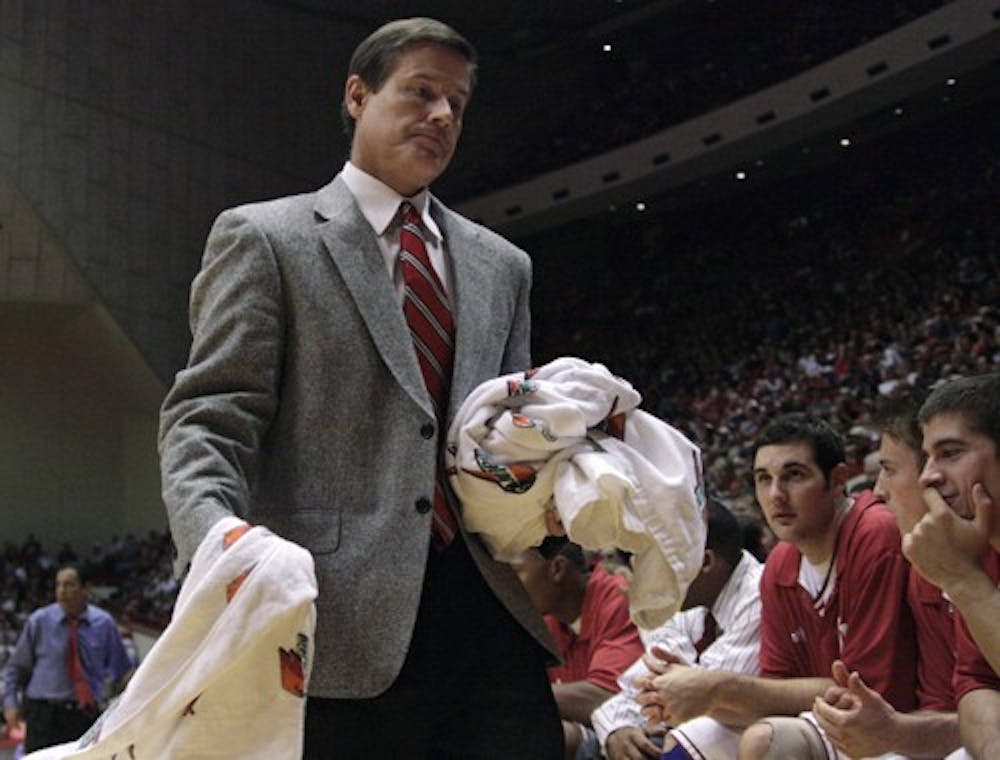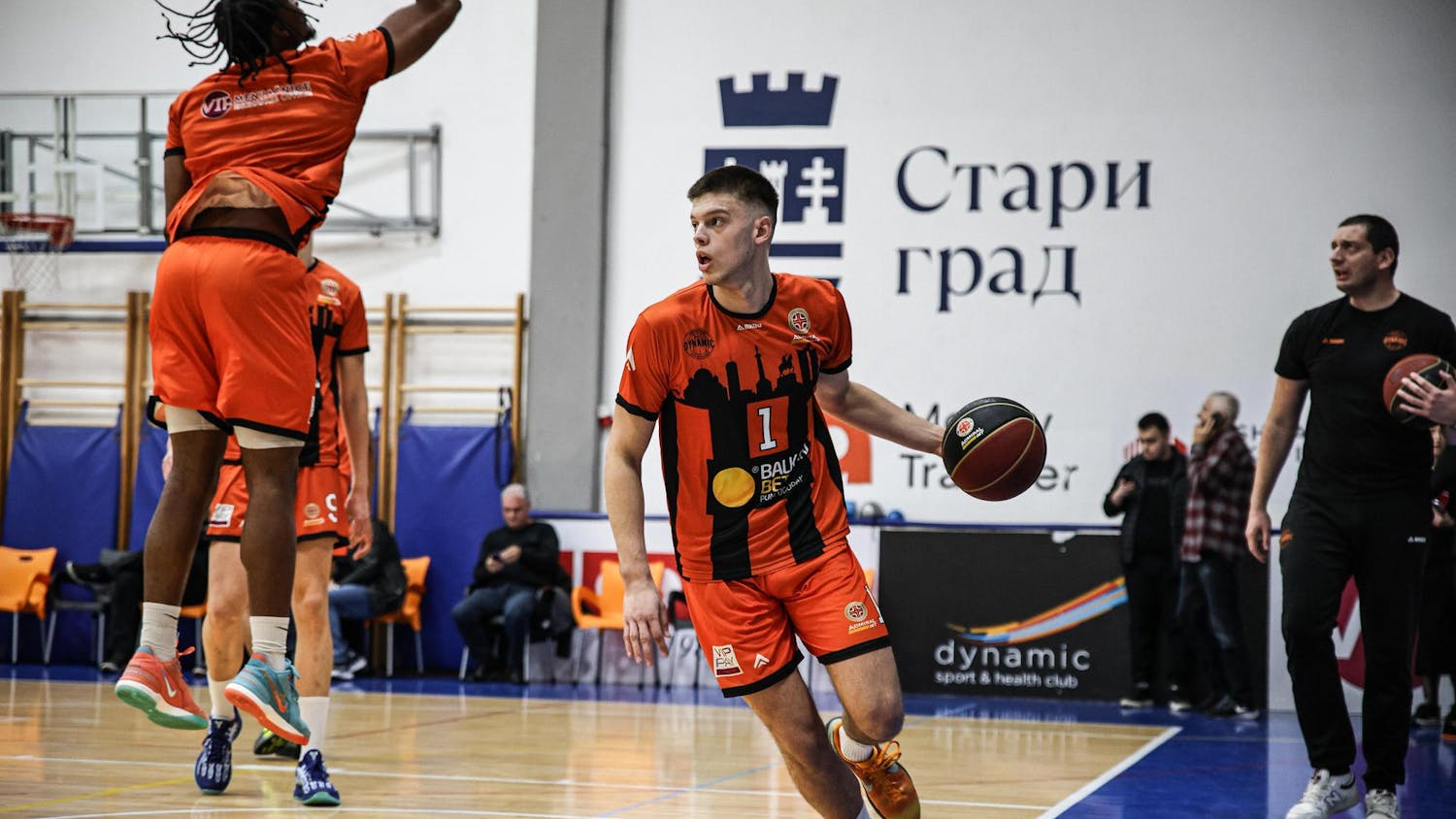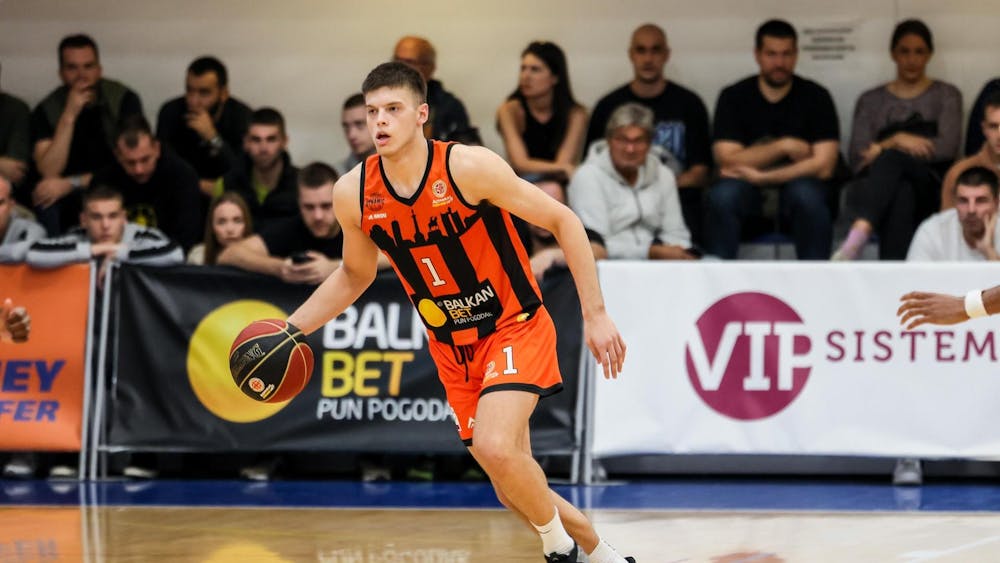The Hall is rockin’.\nIU senior forward D.J. White scores easily on a short jumper on the first possession of an exhibition game to open the 2007-08 basketball season. The much-anticipated second season of Kelvin Sampson’s IU tenure has begun in earnest. \nFans cheer. Coaches yell. Players chatter. Few can resist the electrifying atmosphere that encompasses Assembly Hall.\nOne man on the home team’s bench, however, sits quietly. He follows the action on the court intently but hardly raises a finger to the action of the game. His dark suit and red tie suggest a seriousness of purpose, as does his carefully groomed hair combed neatly to the right. \nHe sits separately, his chair arranged perpendicular to the line of chairs that seat the coaches and players, looking more like a nervous fan that landed the best seat in the house than one of the most important members of the IU men’s basketball staff. \nBut that is exactly who Tim Garl is.\nIn his 27th season as the men’s basketball trainer, Garl, 51, has seen it all before – the buzz, the expectations, the excitement. He has watched the game for most of his life, anticipating the moment when he becomes the most important man in the building. His life has been constructed around such moments. Garl’s IU legacy, however, extends beyond twisted ankles and athletic tape.\nGarl is the one who stayed. \nThat’s how Jennifer, his wife of 18 years, puts it. When Bob Knight was run out of town seven years ago, Garl was the man players looked to for guidance. He could still be found on game day that tumultuous season, sitting in his normal spot on the bench, second chair from the scorer’s table, right next to new head coach Mike Davis. He was one of the few constants for players.\n“Players came to me for advice, for comforting,” Garl said. “I didn’t know a heck of a lot more than they did. But I knew they needed to sit back and see what would happen before any rash decisions were made.”\nWhen Davis announced his resignation toward the end of the 2006 season, Garl once again found himself thrust into the role of counselor. He recalls telling the players, which included this year’s senior class to “take your time, explore your options, don’t react to rumors, don’t act on rumors, wait and see what actually happens.”\nKelvin Sampson took the helm of the basketball program after Davis left and brought with him an entirely different system than the one Garl operated under in his first 25 years at IU. Sampson’s fleet of assistant coaches now occupy the bench area closest to the head coach, so Garl sits on the end, perched on his own island. But he’s not going anywhere.\n“He’s probably spent more hours in Assembly Hall than anybody,” senior forward Lance Stemler said. Considering Garl’s daily in-season routine, which begins with administrative duties at 7 a.m. and ends with treating athletes after practice at 7 p.m., Stemler might have a point. \nGarl arrived in Bloomington in 1980, nine years after the construction of Assembly Hall. He grew up in Elkhart, Ind., the youngest of three children. His parents Thom and Charlotte noticed their son had a passion for sports early in his life. \n“He always liked sports,” Charlotte Garl recalled. “He used to play sandlot football with his friends until he wrecked his knees in junior high. He always wanted to play football in high school, but he was too small, so he became the team manager and trainer in high school for the football team.”\nIt was a role Garl would dedicate his life to. After high school, Garl spent a year at Ball State before transferring to Alabama on the advice of Tom Kurth, the football coach at Elkhart Central High School, with whom he had worked closely during his high school years. Kurth had a connection on the Alabama football staff led by legendary coach Paul “Bear” Bryant at the time. \n“When I first went to college, I wanted somehow to stay involved in athletics,” Garl said. “I originally went to be a teacher or maybe a coach or trainer. The athletic training was my opportunity to stay involved.”\nGarl earned a scholarship for his commitment to Crimson Tide football as a student trainer, and then moved on to become a trainer on the Ole Miss basketball team as a graduate assistant. That’s when Knight, whose trainer had moved on to start his own private practice, came calling. Assembly Hall has been his home ever since.\n“Every workout, every open gym, he’s there early to treat us,” Stemler said. “You need something, you go to Tim, and he will figure it out.”\nStemler is one of hundreds of Hoosier basketball players over the last three decades who have observed Garl’s dedication – and benefited from it. Last season, the forward from Columbia, Ill., suffered an ankle injury that threatened to sideline him for the rest of the year. Garl made sure that didn’t happen, treating the ankle several times a day to make sure Stemler could be on the court when his team needed him most.\n“He’s like our second or third father,” said D.J. White, who broke bones in his foot during his sophomore season. “We joke around with him a lot, but we really appreciate everything he does for us.”\nGarl makes himself available to players 24 hours a day but said he doesn’t pander to their every need.\n“I have a good relationship with most of the players, because I’m not a coach, although I do hold them accountable,” Garl said. “Their performance on the court doesn’t really affect our relationship.”\nFor all the hours Garl puts in, he refuses to take any credit. He said the satisfaction of his role in Hoosier basketball comes from the knowledge that he has helped players fulfill their dream and reach their goals. \nHis unselfish mentality stretches back to his days at Alabama, when Bryant constantly reminded his teams about the importance of “conducting yourself with class.” \n“You can’t go out and act any other way,” Garl said. “You have to compete, you have to work hard. You should be disappointed when you lose and not overly joyous when you win and understand that this whole thing isn’t all about me, it’s about the program.”
‘The one who stayed’
Athletic trainer Tim Garl has tended to the Hoosiers for more than 25 years

Get stories like this in your inbox
Subscribe





